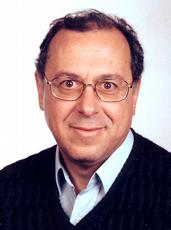ETH Zurich researcher wins “Asia’s Nobel Prize”
Demetrios Christodoulou, a mathematician and physicist at ETH Zurich, wins the illustrious “Shaw Prize in Mathematical Sciences”. The award of “Asia’s Nobel Prize” honours Christodoulou’s contributions to differential geometry and to the general theory of relativity. His prize is worth USD 500,000.

Demetrios Christodoulou, Professor of Mathematics and Physics at ETH Zurich, has won the “Shaw Prize in Mathematical Sciences”. According to the Shaw Prize Foundation in Hong Kong, Demetrios Christodoulou is being honoured for his highly innovative research work on non-linear partial differential equations in Lorentzian and Riemannian geometry and their applications to general relativity and topology.
Since 2004, the Shaw Prize Foundation has honoured astronomers, life scientists and mathematicians who have achieved a significant scientific breakthrough that has resulted in a positive impact on mankind. The Foundation was established by Run Run Shaw, the founder of a major film company in Hong Kong.
In the distinguished company of the most renowned geometricians
A happy Demetrios Christodoulou says, “I feel very honoured, because the Shaw Prize is “Asia’s Nobel Prize” and, together with the Abel Prize is the highest award available for mathematicians. It has always been awarded exclusively to outstanding mathematicians.” According to Christodoulou, China’s Shiing Shen Chen, the first winner of the Shaw Prize in Mathematical Sciences, was “the most important geometrician of the 20th century”. The second winner, Andrew John Wiles, became well-known far beyond the world of mathematics when, in 1994, he succeeded in proving what is known as Fermat’s conjecture. Prior to that, mathematicians had laboured in vain for about 350 years on a solution of this equation by the French mathematician Pierre de Fermat.
Until 2006, the so-called Poincaré conjecture was one of the seven most important unsolved problems in mathematics. Then the Russian mathematician Grigori Yakovlevich Perelman managed to prove this theorem of the famous French mathematician Henri Poincaré.
The decisive foundation for Perelman’s proof was laid by the American Richard S. Hamilton, Professor of Mathematics at Columbia University in New York.
Hamilton and Christodoulou share the 2011 Shaw Prize in Mathematical Sciences, endowed with one million dollars. Demetrios Christodoulou says, “I am particularly pleased because I have the highest esteem for his work in differential geometry. Hamilton is also one of my closest friends.”
Demetrios Christodoulou has taught and
researched at ETH Zurich since 2001. His research focuses on partial differential
equations and differential geometry in conjunction with the development of
general relativity and fluid mechanics. His papers have already been honoured
several times in the past: for example he received the Otto Hahn Medal in 1981,
the Bocher Memorial Prize of the American Mathematical Society in 1999 and the Tomalla
Prize for gravity research in 2008.







READER COMMENTS